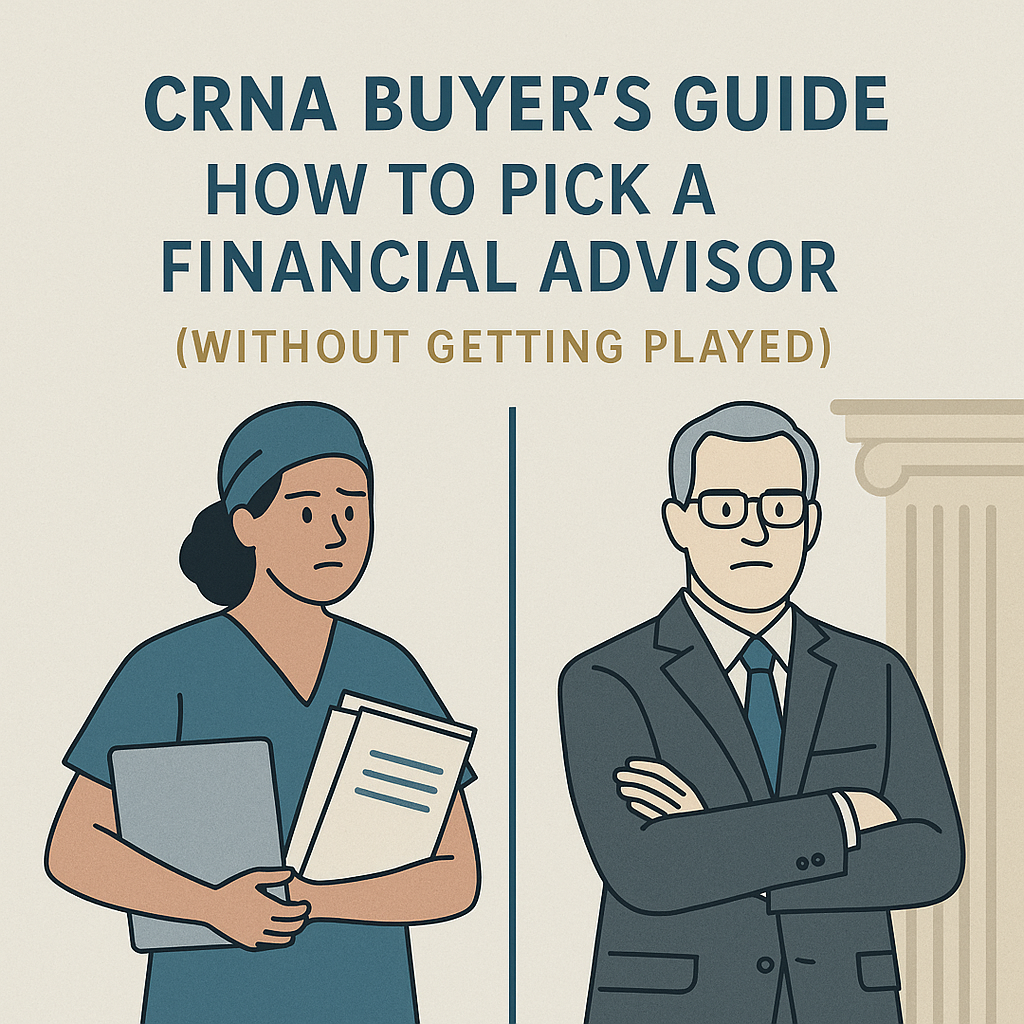Spoiler alert: Most financial advisors don’t understand CRNAs. Some don’t even know what a CRNA is. So let’s fix that.

Meet Sarah.
She’s a badass CRNA making $280k, still juggling student loans, a 1099 side gig, and her third credentialing packet this month. She knows she should be doing something smarter with her money—but every time she googles “financial advisor,” she ends up on a firm’s homepage featuring some 65-year-old in a suit talking about “holistic wealth solutions.”
Hard pass.
This post is for the Sarahs of the world—the CRNAs who want to get their financial 💩 together but don’t want to be sold life insurance in the process.
Step 1: Don’t Hire Someone Who Has to Google “1099 vs W2”
CRNAs are not like dentists or teachers. You’ve got:
- Wildly inconsistent income
- Massive earning potential straight out of school
- A 401(k) here, a SIMPLE IRA there, maybe an orphaned 403(b) from your RN days
- Call shifts, student loans, and the occasional $10k locum bonus thrown into the blender
If your advisor doesn’t already know how all of that plays together—especially how to minimize taxes while maximizing your savings—you’re basically their guinea pig. No thanks.
Step 2: Look for the Word “Fiduciary” (Then Confirm They Know What It Means)
This is the bare minimum: your advisor should legally be required to act in your best interest. That’s what “fiduciary” means.
If they aren’t a fiduciary, they’re allowed to recommend investments that pay them more—like your hospital cafeteria choosing to serve only Hot Pockets because the rep gave them a free panini press.
I’m a fiduciary. That should be table stakes.
Step 3: Know How They Get Paid (And How Much You’re Really Paying)
Here’s the breakdown:
- Fee-only = transparent, no commissions, no weird back-end kickbacks.
- Commission-based = run. Just… run.
- Fee-based = often a wolf in sheep’s clothing. (They charge you AND get paid by the products they sell.)
At my firm, we charge a flat monthly fee for financial planning and tax work, and a percentage for managing investments. No sales pitches. No creepy annuities. No “Oops, forgot to tell you I make 7% when you buy that fund.”
Step 4: Check Their Niche (Hint: “We Work With Everyone” Means No One)
You want someone who works with CRNAs day in and day out. Someone who:
- Understands credentialing delays and sign-on bonuses
- Can forecast tax liability from a $312k 1099 contract plus a part-time W2
- Knows how to set up a Solo 401(k) without a Google search
That’s literally my job description. I don’t try to be everything to everyone—I’m here for CRNAs who want to build wealth without wasting time or getting sold fluff.
Step 5: Make Sure They Get You
Financial advice isn’t just about spreadsheets. It’s about life.
- Want to take a 3-month sabbatical? Cool—let’s make the cash flow work.
- Not sure how to balance W-2 and 1099? I’ve got you.
- Feel like you’re making good money but still broke? That’s a solvable math problem.
You need someone who listens without judgment and builds a plan that matches your life—not someone who gives you a 48-page PDF and calls it a day.
Step 6: Spot the Red Flags Before It’s Too Late
Let’s call out a few classics:
- ❌ “I only get paid if you make money.” (Commission alert.)
- ❌ “You need to buy this insurance product now.” (No. No, you don’t.)
- ❌ “Annual check-ins are enough.” (How’s that going to help when your tax bill surprises you in April?)
Ask how they communicate. Ask what happens when life changes mid-year. Ask what tools they use (if it’s Excel from 1998… maybe reconsider).
Step 7: Green Flags That Mean You’re in Good Hands
- ✔️ They’re a fiduciary
- ✔️ CFP®, EA, or CPA credentials
- ✔️ Understand CRNA career paths (W2, 1099, travel gigs, etc.)
- ✔️ Proactively handle tax projections and not just investments
- ✔️ Charge in a way that’s clear and makes sense
- ✔️ Will actually talk to you more than once a year
So, Who Should You Work With?
Well… I know a guy. 😏
Here’s the truth: I built Barnhart Wealth + On Point CRNA specifically for CRNAs like you. I married one. I’ve sat at the kitchen table helping her decode credentialing, tax forms, and job offers that looked better than they were.
If you want a plan that doesn’t just sound good but actually works—without having to become a tax expert on the side—let’s talk.
👉 Book a Free Call (no pressure, no jargon, no judgment)
TL;DR
Hiring a financial advisor as a CRNA doesn’t have to be a mystery. Just don’t settle for:
- A generalist
- A salesperson
- Or someone who thinks “locum tenens” is a Harry Potter spell
Don’t get played. CRNAs deserve advisors who speak their language, respect their lifestyle, and protect their cash.
Anything less? Hard pass. You’ve got a career worth protecting. Now get an advisor who treats it that way.

